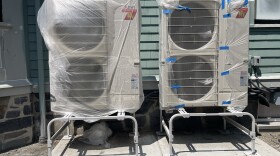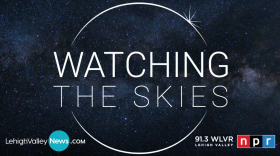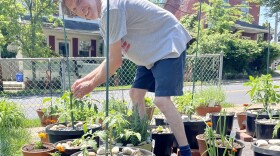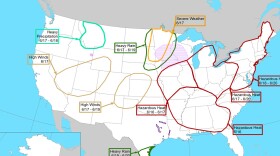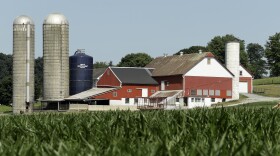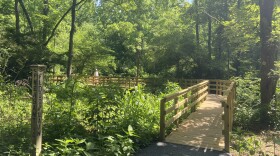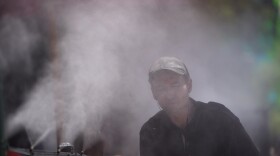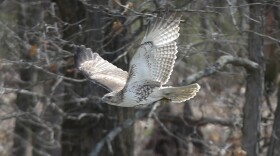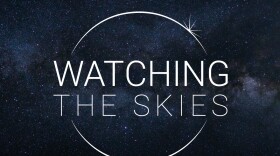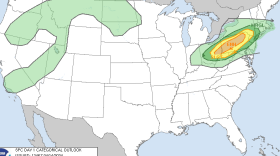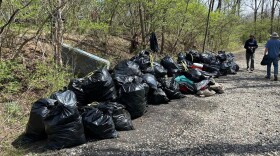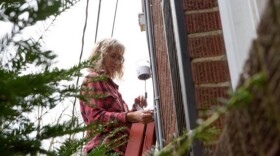-
Grant applications for the Municipal Opportunities for Retrofits and Energy Efficiency, or MORE, Program are open. Loans are also available through a Lehigh Valley lender.
-
With temperatures expected to stay in the 90s this week, electric companies are sharing ways for customers to keep their bills low while keeping cool.
-
This week, the basics of watching what Juliet, that star-crossed lover, called the 'inconstant moon.'
-
Pushed by the pandemic, backyard gardens are hotter than ever. One Bethlehem man starts months before the weather is right.
-
No matter what we call it, hazardous heat is expected across the Mid-Atlantic and Northeast, according to the Weather Prediction Center.
-
Three farms in Lehigh and Northampton counties were the latest to be included in the state’s Farmland Preservation Program. The program aims to ward off development and protect open spaces.
-
Heat and humidity will build for the afternoon, heightening a severe weather risk for the Lehigh Valley on Friday, forecasters say. It comes before a heat wave arrives in the region next week.
-
For the first time in more than three decades, and at a cost of nearly $500,000, the Boardwalk at the Dorothy Rider Pool Wildlife Sanctuary.has been completely restored and made compliant with the Americans with Disabilities Act.
-
Heat index outlooks — projecting what it feels like outside with the heat and humidity combined — push feels-like temperatures near triple digits between June 17-21 and top 100 degrees in the Lehigh Valley between June 19-25.
-
More than two dozen state legislators, including one from the Lehigh Valley, have co-sponsored HB2238, which would eliminate the use of per- and poly-fluoroalkyl substances, or PFAS, in household products.
-
Join Megan Frank at 9:30 a.m. and 6:30 p.m. every Friday for Insights with LehighValleyNews.com on WLVR. This week, Megan is joined by Tom Shortell and Molly Bilinski.
-
Northampton County Conservation District held its annual Envirothon, where students go head-to-head in immersive challenges in the soil, mud, and woods — competing for hundreds of dollars. Teachers say it's special because it gets kids off their phones and experiencing the natural world, and each other.
-
The spring migration count at Hawk Mountain has begun. It runs through May 15.
-
EPA officials last week announced the first-ever national drinking water standard regulating per- and poly-fluoroalkyl substances, or PFAS, which are widespread, long-lasting in the environment and have been linked to long-term health issues.
-
A female mallard duck has stolen the spotlight at the Promenade Saucon Valley after nesting in a planter. Her month-long residence will postpone landscaping plans, but her newfound popularity is making up for it.
-
First introduced by state Sen. Lisa Boscola in 2015, the bill would increase penalties and direct any money collected toward bald and golden eagle conservation efforts in Pennsylvania.
-
Brandon Krock has 440,000 seeds to plant at Fox Summit Farm, a pick-your-own sunflower farm that will return this summer in the Lehigh Valley. He's planning fireworks, food trucks, a 5k and more.
-
WLVR's Brad Klein and Marty McGuire, known as Bethlehem's 'Backyard Astronomy Guy' spoke over the phone about the April 8 total solar eclipse. The path of totality veered toward the Northeast, where McGuire saw it from New York.
-
A severe weather threat is on tap for Sunday, forecasters warn, with a tornado threat for central Pennsylvania and damaging winds possible in the Lehigh Valley.
-
From April 20 through April 28, residents are invited to join or host a cleanup along a section of the D&L Trail as part of a trash collection competition. Winners will be announced May 3.
-
More than 2,000 acres on 28 farms in 15 counties across the commonwealth were preserved. Here are the Lehigh Valley farms now safe from development.
-
More than six months after its launch, 33 air quality monitors have been installed throughout the Lehigh Valley as part of Lehigh Valley Breathes, a regionwide effort to monitor air quality amid emissions from trucking and warehousing.


